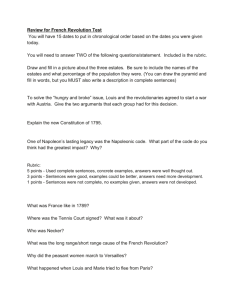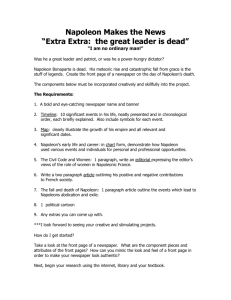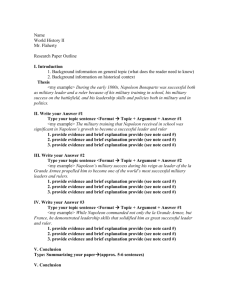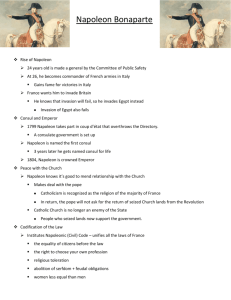Social Studies 9 – Practice Final Exam ANSWER THE TEST ON
advertisement
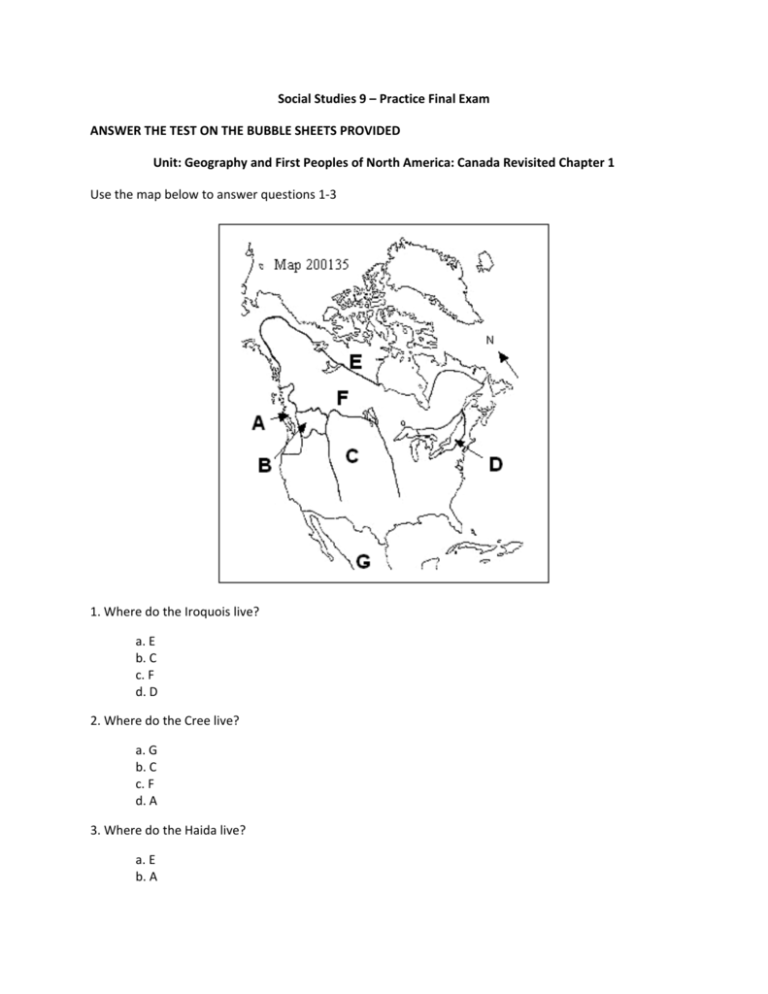
Social Studies 9 – Practice Final Exam ANSWER THE TEST ON THE BUBBLE SHEETS PROVIDED Unit: Geography and First Peoples of North America: Canada Revisited Chapter 1 Use the map below to answer questions 1‐3 1. Where do the Iroquois live? a. E b. C c. F d. D 2. Where do the Cree live? a. G b. C c. F d. A 3. Where do the Haida live? a. E b. A c. F d. D 4. A system where family relationships are traced through the mother’s descendants, not the father’s. a. caste system b. matrilineal c. patrilineal d. anthropology 5. A system were family relationships are traced through the father’s descendants, not the mother’s. a. caste system b. matrilineal c. patrilineal d. anthropology 6. A nutritious food that was popular with fur traders. a. power bars b. oolichan grease c. smoked salmon d. pemmican 7. Traditional housing for the First Peoples of the Northwest Coast a. tipi b. longhouse c. dugout or pit house d. cabin 8. Traditional housing for the First Peoples of the B.C. interior. a. tipi b. longhouse c. dugout or pit house d. cabin 9. Traditional housing for the First Peoples of the Great Lakes Region a. tipi b. longhouse c. dugout or pit house d. cabin 10. Traditional housing for the First Peoples of the Great Plains a. tipi b. longhouse c. dugout or pit house d. cabin Unit: Exploration and Colonization I: Canada Revisited Chapter 2 11. The first European group to set up a temporary settlement in Newfoundland was: a. British b. French c. Viking d. Dutch 12. The name of the Italian explorer who sailed for England and reached Newfoundland, claiming it for England: a. John Cabot b. Jaques Cartier c. Christopher Columbus d. Samuel de Champlain 13. The name of the explorer who first traveled up the St. Lawrence River as far as Hochelega was: a. John Cabot b. Jaques Cartier c. Christopher Columbus d. Samuel de Champlain 14. The name of the explorer who attempted a permanent settlement in Canada, but failed when most men died in the first winter was: a. John Cabot b. Jaques Cartier c. Christopher Columbus d. Samuel de Champlain 15. The name of the explorer who built Canada’s first permanent settlement at today’s Quebec city was: a. John Cabot b. Jaques Cartier c. Christopher Columbus d. Samuel de Champlain 16. The Native peoples who worked with the French were: a. the Iroquois b. the Beothuks c. the Blackfoot d. the Hurons 17. The Native peoples who worked with the Dutch and later the English were: a. the Iroquois b. the Beothuks c. the Blackfoot d. the Hurons Unit: Exploration and Colonization II – New France: Canada Revisited Chapter 3 18. The French colony of Acadia makes up which present‐day provinces or territories? a. Newfoundland, Quebec, Nova Scotia and Ontario b. Northwest Territories, Quebec, New Brunswick, and Ontario c. Newfoundland, Nova Scotia, Quebec and Ontario d. New Brunswick, Nova Scotia, Prince Edward Island and Quebec 19. When New France became a “Royal Colony” in 1663, this meant that it was now governed directly from France by: a. the Jesuits b. the monarch c. the foreign minister d. the Pope 20. The government of the Royal Colony of New France was the: a. Roman Catholic Church b. the ordinary people of New France c. The Sovereign Council d. the Captitaine de Milce 21. The system of land‐holding that developed in New France was known as the a. parish system b. the free‐hold system c. the seigneurial system d. the charter system 22. Who was the first Bishop of New France? a. Jean Talon b. Stephen Colbert c. Comte de Frontenac d. Francois de Laval 23. A church landholding in New France was called: a. a parish b. a seigneury c. a habitant d. a ville 24. A farmer in New France was called a a. seigneur b. habitant c. intendant d. a filles du Roi 25. Which of the following was NOT true about the Sovereign Council of New France? a. it carried out the wishes of the King of France b. ordinary people got jobs on the council c. lawyers were not part of the council d. most of its members were from the nobility 26. Which job titles were NOT part of the Sovereign Council? a. the Bishop and Intendant b. the Governor General and clerk c. the councilors and attorney general d. the Capittaine de Milce and Seigneur 27. Which of the following was NOT a duty of a habitant? a. serving a corvee b. paying taxes c. contributing to the construction of churches d. serving in the militia Unit: British Colonization and Control of North America: Canada Revisited Chapter 4 28. The Acadians were the people of North America who: a. joined with the French in defeating the British b. who refused to take the British oath of allegiance and lost their homes c. joined with the British in the final defeat of the French in North America d. were English‐speaking inhabitants of Quebec 29. The leader of the British forces in the battle at Quebec City was: a. General James Wolfe b. Captain Knox c. Governor Murray d. General Louis‐Joseph Montcalm 30. The leader of the French forces in the battle at Quebec City was: a. General James Wolfe b. Captain Knox c. Governor Murray d. General Louis‐Joseph Montcalm 31. The battle of Quebec City took place at: a. Montgomery’s Tavern b. The Upper Town c. The Lower Town d. The Plains of Abraham 32. This fortress was built by the British to defend against the French in Acadia: a. Louisbourg b. Port Royal c. Halifax d. 13 Colonies 33. Why was the control of Acadia so important in the war for North America: a. good farmland. b. control over access to the St. Lawrence River. c. Governor Murray d. access to poutine reserves. 34. The law that allowed for a compromise of British style government in New France, while allowing for some protection of French culture (biculturalism) was called: a. The Treaty of Utrecht b. The Quebec Act of 1774 c. The Proclamation of 1763 d. The Peace of Paris Unit: The American Revolution and British North America – Canada Revisited Chapter 5‐6 35. A refusal to trade with a country or a company a. veto b. boycott c. ban d. civil disobedience 36. A British colonist in America who rebelled against Britain during the American Revolution: a. loyalist b. privateer c. Patriot d. rebel 37. A British colonist in America who fought to keep the 13 colonies part of the British Empire, or fled north to what is now Canada: a. loyalist b. privateer c. Patriot d. rebel 38. When citizens elect a person to speak for them in an elected assembly or parliament, this person is a: a. privateer b. representative c. governor d. sovereign 39. When a nation is independent control by an imperial power it is called: a. sovereign b. dominion c. protectorate d. vassal 40. The name for Quebec after the Constitution Act of 1791: a. Lower Canada b. Upper Canada c. Canada West d. Canada East 41. The name for Ontario after the Constitution Act of 1791: a. Lower Canada b. Upper Canada c. Canada West d. Canada East Unit: The English Civil War – Crossroads Chapter 1‐2 42. James I believed that his right to rule came from: a. House of Commons b. House of Lords c. God d. The will of the people 43. The body of water between Great Britain and the continent of Europe is called the a. English Channel b. Atlantic Ocean c. Bering Strait d. Mediterranean Sean 44. What part of the English system of government made the law? a. b. c. d. The monarch The courts Parliament Church councils 45. The area of Britain most important politically and the most heavily populated is: a. b. c. d. The south west coast The south east coast The north The eastern coast 46. Which of the following helps to explain the popularity of Queen Elizabeth I? a. b. c. d. English explorers discovered many parts of the world She never married She seldom asked for extra tax money She worked well with parliament 47. How did Charles I try to raise money when parliament refused to vote taxes for him? a. b. c. d. e. He begged and borrowed He forced wealthy people to loan him money He abolished parliament and made laws by himself He brought back old taxes All of the above 48. What was the last name of James I, Charles I and Charles II? a. b. c. d. Windsor Cromwell Tudor Stuart 49. How did Charles react when the long Parliament declared him a tyrant? a. b. c. d. He ran away to hide in France He ran away to hide in Scotland He tried to arrest radical members of parliament He did nothing 50. What name was given to supporters of the king? a. b. Puritans Cavaliers c. d. Roundheads Beefeaters 51. Why did roundheads cut their hair short? a. They were proud of the shape of their heads b. They had perfectly‐spherically‐shaped helmets c. The name had a good sound when yelled in battle d. They wanted to show that they were not Cavaliers 52. Who was the leader of the Roundheads? a. The King b. Prince Rupert c. Oliver Cromwell d. Lord Manchester 53. What advantage did the New Model Army have over the King's forces? a. More religious zeal b. More enthusiasm for their cause c. Good discipline d. Better strategy and training e. All of the above f. None of the above 54. What did Charles I do after losing the First Civil War? a. He ran away to hide in France b. He ran away to hide in Scotland c. He claimed victory anyway d. He died in the war 55. What was the point of "Prides Purge"? a. To kill the king b. To kick the Presbyterians out of Parliament c. To kick the Puritans out of Parliament d. To kick Cromwell out of power 56. What group charged the king with treason? a. The Rump Parliament b. The Cavaliers c. The Royalist d. The Scots 57. Why did Cromwell overthrow government and rule on his own? a. Parliament was too divided to rule properly b. Too many people were going off in different directions c. Parliament would not hold elections d. He was afraid another king would be put in place 58. What title was Cromwell given as leader of the Commonwealth? a. Overlord of England b. King Oliver I c. Major General of the Commonwealth d. Lord Protector 59. Cromwell forbade all of the following activities EXCEPT a. Dancing b. Protestant church services c. Sports d. Theatres 60. After Cromwell's death, who became the ruler of England? a. The son of King Charles I b. Richard Cromwell c. Prince Rupert d. Queen Elizabeth I 61. What was the purpose of the Test Act? a. Members of the Catholic church could not have government positions. b. Only Catholics could be members of Parliament c. People entering Parliament had to pass a special test d. Everybody had to belong to the same church 62. What is (and was) the benefit of the Habeas Corpus Act? a. Bodies must be buried within a week of death (better health conditions) b. Contagious diseases must be reported to a health officer c. People cannot be held in jail without a trial d. People cannot be sentenced to death 63. Why did Parliament not want James II as king? a. He ignored his results from the Test Act b. He was Catholic c. He spent lots of money d. He had an unpleasant personality 64. What was the most important outcome of the "Glorious Revolution" of 1689? a. King James II started another civil war b. Mary and William of Orange became monarch c. Bill of Rights made Parliament the real government d. People of all religions could worship as they pleased 65. What type of government was established in Britain as a result of the civil war and the Glorious Revolution? a. An absolute monarchy b. Rule by the divine right of kings c. Despotic tyranny d. Constitutional Monarchy 66. The general tendency of policies of the Tory party was to a. support a monarchy b. oppose the monarchy c. Promote trade d. National healthcare 67. The general tendency of policies of the Whig party was to a. support a Catholic monarchy b. oppose a Catholic monarchy c. Promote trade d. National healthcare Unit: The French Revolution and the Enlightenment: Crossroads Chapter 3 68. What type of government had Louis XIV established in France? a. A constitutional monarchy b. A parliamentary monarchy c. An absolute monarchy d. A republic 69. Before 1789, French society was divided by law into groups called: a. Classes b. Parishes c. Departments d. Estates d. All of the above 70. Why did French peasants feel they had a grievance against the Old Regime? a. They were still Medieval serfs b. They were burdened with heavy taxes c. They had no opportunities for advancement d. They had to serve in the military 71. Another term for a person from the Nobility is: a. Rich and Famous b. Third Estate c. Aristocrat d. Government official 72. What was the most serious economic problem facing the French government in the mid‐eighteenth century? a. It had a huge debt that it had to pay to bankers b. Contagious diseases like the black death c. Poor people were starving to death in the cities d. Year after year of poor harvests 73. What special problem in France made the problems of the poor worse in the years 1787 and 1788? a. Wars with foreign countries b. Poor harvests caused food shortages c. A plague infested city slums d. The government outlawed all poor people 74. Why did King Louis XVI call a meeting of the Estates General in the spring of 1789? a. To raise more tax money by taxing the Aristocrats b. To listen to what people had to say about him c. To write a new constitution for France d. To raise money for a war against the Austrians 75. How did the Third Estate react when the king refused to let them meet together with the other two estates? a. They arrested the king and took him to Paris b. They refused to meet and went home for 3 years c. They set fire to Versailles and stormed the Bastille d. They had their own meeting and became the National Assembly 76. What was the intention of the Third Estate when they took the “Tennis Court Oath”? a. To force the other two estates to join with them b. To get rid of the king c. To write a new constitution for France d. Never disband 77. Why did the monarchs of Prussia and Austria invade France? a. To get rich by stealing French treasures and land b. To reinstate the French nobility to their former privileges c. Mercantilism d. Because they did not like the French flag 78. What political party was moderate and believed in equality and freedom of religion. a. Girondins b. Puritans c. Jacobins d. NDP 79. What political party was radical, atheist, and was responsible for “The Terror”. a. Girondins b. Puritans c. Jacobins d. NDP 80. This group was set up to “do anything to save France”. a. Committee of Popular Security b. Committee of Peace and Security c. Committee of Peoples Safety d. Committee of Public Safety 81. The Law of Suspects was intended to: a. Protect your legal rights to trial b. Find and prosecute enemies of the revolution c. Help identify all suspects in a crime d. Imprison enemies of the church e. all of the above 82. This law prevented essential goods from being sold at very high prices during the war against Austria and Prussia. a. Law of Inflation b. Law of Prices c. Law of Maximum d. Law of Minimum 83. What happened at the Coup of Thermidore? a. COP officials arrested to end the Terror b. Girondins removed from the National Convention c. King put on trial and executed d. France beat Austria in first FIFA soccer match 84. This was the preferred method of execution during the Terror. a. Stoning b. Burning at the stake c. Cutting off head with an axe d. Guillotine 85. This man was the key figure leading the Terror. a. Voltaire b. Robespierre c. Rousseau d. Locke e. Hobbes 86. He said that without a strong ruler life would be “nasty, brutish, and short”. a. Voltaire b. Robespierre c. Rousseau d. Locke e. Hobbes 87. He wanted a strong enlightened monarch with freedom of religion and thought. a. Voltaire b. Robespierre c. Rousseau d. Locke e. Hobbes Unit: Napoleon – Crossroads Chapter 4 88. Napoleon was born: a. in Waterloo b. on the island of St. Helena c. on the island of Corsica d. Paris, France 89. Which of the following was the major career advantage Napoleon gained by his “whiff of grapeshot”? a. he made money selling the family vineyard. b. He subdued a Paris riot. c. He became popular with the masses d. He saved the Directory and brought himself to their attention. 90. Why did Napoleon invade Egypt? a. To discover the secrets of the pyramids. b. To cut the British route to India. c. To follow the route of Alexander the Great towards Persia. d. To begin a French empire in North Africa. 91. All of the following are features of the Napoleonic Code EXCEPT: a. All men were equal before the law. b. It guaranteed freedom of religion. c. Women had equal rights to men. d. Every person had a right to work in any occupation. 92. What was the purpose of the lycees set up by Napoleon? a. To teach all children up to grade 6. b. To provide educated, loyal government officials. c. To give the rich people somewhere to send their children. d. To complete the French system of free public education. 93. What was the greatest extent of Napoleon’s empire? a. All of Europe. b. Western Europe. c. Continental Europe from France to the Russian border. d. France and the countries that bordered France. 94. What were the “satellite/vassal” states in Napoleon’s empire? a. Countries ruled Napoleon’s relatives. b. Countries who followed Napoleon’s policies. c. Countries that rebelled against France. d. Countries following Napoleon’s new space program. 95. The Napoleonic Code was important because it: a. restored good relations between the Catholic Church and the French government b. made men and women equal before the law c. preserved all the reforms passed during the revolution d. gave France a uniform system of law 96. Why was the naval battle of Trafalgar so significant to the battle plans of Napoleon? a. It prevented his fleet from sailing to conquer America. b. It stopped his plans for the invasion of Britain. c. It prevented his plans to re‐invade Europe. d. It allowed him to beat the Swiss Navy. 97. What was Napoleon’s Continental System? a. A ban on trade with Britain. b. Another name for Napoleon’s empire. c. A European free trade community centered on France. d. A demand that all European countries supply troops for Napoleon’s armies. 98. What aspects of the Russian campaign did great damage to the French armies? a. The vigorous attacks by the Russian Cossacks. b. The lack of supplies like food and ammunition. c. The Russian “scorched earth” policy. d. The bitter cold of the Russian winter. e. All of the above. 99. How did other European countries take advantage of Napoleon’s failure in Russia? a. They rallied around to help him. b. They teamed up to defeat him. c. They insisted on claiming their independence. d. The decided to wait and see what would happen. 100. What force in European politics had developed during the Napoleonic Empire and had helped to overthrow Napoleon? a. Economics b. Religion c. Nationalism d. Democracy




